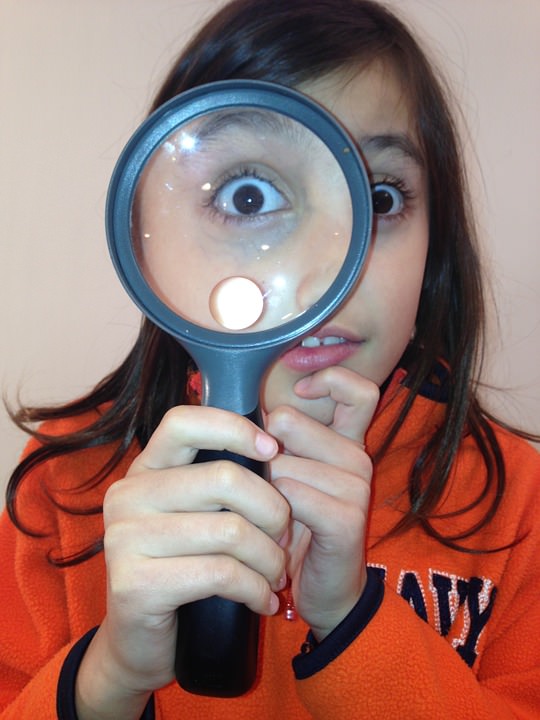1.1 科学目标
章节大纲
-
What is science?
::什么是科学?The goal of science is to learn how nature works by observing the natural and physical world and to understand this world through research and experimentation. Science is a distinctive way of learning about the world through observation , inquiry, formulating and testing hypotheses , gathering and analyzing data, and reporting and evaluating findings. We are all part of an amazing and mysterious phenomenon called "life" that thousands of scientists every day are trying to better understand. It is surprisingly easy to become part of this great discovery. All you need is an understanding of how people use the process of science to learn about the world and your natural curiosity.
::科学的目标是通过观察自然和物理世界来了解自然如何运作,并通过研究和实验来了解这个世界。科学是通过观察、调查、制定和测试假设、收集和分析数据以及报告和评估研究结果来了解世界的独特方式。我们都是一个叫“生命”的惊人和神秘现象的一部分,这个现象每天都有数千名科学家试图更好地了解。成为这一伟大发现的一部分令人惊讶地容易。你只需要了解人们如何利用科学过程来了解世界和你的自然好奇心。Goals of Science
::科学目标The term science is derived from the Latin word, scientia , which means “knowledge.” Science involves objective, logical, and repeatable experimental attempts to understand the principles and forces working in the natural universe. Science is an ongoing process of testing and evaluation and is guided by a universal set of principles. One of the intended lessons of "Goals of Science" is for you to become more familiar with the scientific process.
::科学一词源于拉丁语“科学”一词,即“知识”的意思。 科学涉及客观、逻辑和可重复的实验尝试,以了解在自然宇宙中工作的原则和力量。科学是一个持续的测试和评估过程,并以一套普遍的原则为指导。 “科学目标”的预期教训之一是让你更加熟悉科学过程。Humans are naturally interested in the world we live in. Young children constantly pose the question "why." The goal of science is to answer these questions. You may not realize it, but you are performing all the time. For example, when you shop for groceries, you may end up carrying out a type of scientific experiment ( Figure ). If you know you like Brand X of salad dressing but Brand Y is on sale, perhaps you will try Brand Y. If you end up liking Brand Y, you may buy it again even when it is not on sale. If you did not like Brand Y, not even a sale would entice you into buying it again. Your conclusions are essentially based on an experiment. To find out why a person might prefer a salad dressing over another, you might examine the cost, ingredient list, or packaging of the two salad dressings.
::人类自然对我们所生活的世界感兴趣。 幼儿不断提出“ 为什么”问题。 科学的目标是回答这些问题。 你可能没有意识到, 但总是在做。 例如,当你买菜时, 你可能会进行某种科学实验( 图表 ) 。 如果你知道你喜欢色拉酱的Brand X, 但是Brand Y正在出售, 也许你会试试Brand Y。 如果你最后喜欢Brand Y, 即使它不是卖的, 你也可以再买一次。 如果你不喜欢Brand Y, 甚至一个销售也不会吸引你再次买它。 你的结论基本上是基于一个实验。 要找出为什么一个人喜欢一个色拉酱而不是另一个,你可能会检查两个色拉酱的成本、 成分列表或包装。Shopping sometimes involves a little scientific experimentation. You are interested in inventing a new type of salad that you can pack for lunch. You might buy a vegetable or salad dressing that you have not tried before to discover if it would make an appealing addition to your salad. If you like it, you will probably buy it again. This is a type of experiment in which you have discovered a liking for something new. There are many different areas of science or scientific disciplines , but all scientific study involves:
::科学或科学学科有许多不同领域,但所有科学研究都涉及:-
asking questions
::问 问 问 问 问 -
making observations
::提出意见和意见 -
relying on
evidence
to form conclusions
::依靠证据得出结论 -
being skeptical about ideas or results
::对想法或结果持怀疑态度
Skepticism is an attitude of doubt about the truthfulness of claims that lack empirical evidence. Scientific skepticism also referred to as skeptical inquiry, questions claims based on their scientific verifiability rather than simply accepting claims based on faith or anecdotes. Scientific skepticism uses critical thinking to analyze such claims and opposes claims that lack scientific evidence.
::怀疑论是怀疑缺乏经验证据的主张的真实性的一种怀疑态度。 科学怀疑论也被称为怀疑性调查,基于科学可核查性而不是单纯接受基于信仰或厌食症的主张。 科学怀疑论利用批判性思维分析这种主张,反对缺乏科学证据的主张。Summary
::摘要-
Scientific skepticism questions claims based on their scientific verifiability rather than accepting claims based on faith or anecdotes.
::科学怀疑论者基于其科学可核查性而不是接受基于信仰或偏执的主张而提出的主张。 -
Scientific skepticism uses critical thinking to analyze such claims and opposes claims that lack scientific evidence.
::科学怀疑主义利用批判性思维分析这些主张,反对缺乏科学证据的主张。
Review
::回顾-
What is science? What is the goal of science?
::什么是科学?科学的目标是什么?科学的目标是什么? -
What is an experiment? Why are experiments performed?
::什么是实验?为什么进行实验? -
Describe scientific skepticism.
::描述科学怀疑论。
-
asking questions

